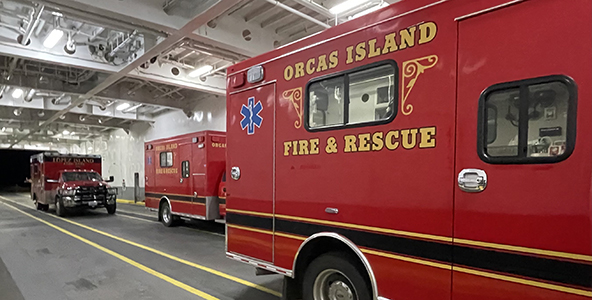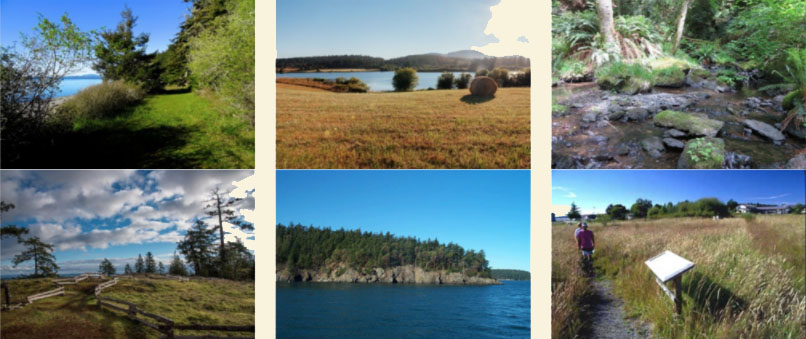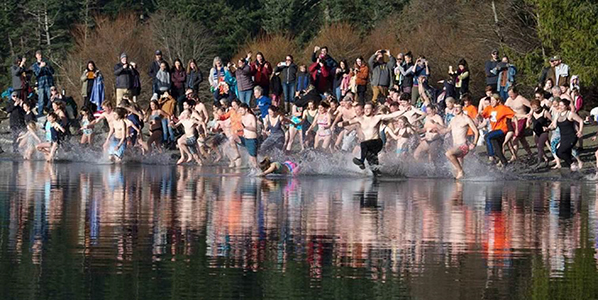Hedrick Smith, Orcas Island resident and Pulitzer Prize-wining journalist, is bringing his PBS Television Documentary, “Poisoned Waters,” live to Orcas viewers, to restate his belief that solutions for complex environmental problems require public involvement at the grass roots. “Poisoned Waters,” which was first broadcast nationwide on April 21 on the prestigious “Frontline” series, analyzes the environmental health of premier waterways like Puget Sound and Chesapeake Bay. It asks why it is so difficult to save these waterways and shows some strategies that are working.
Smith’s documentary has been widely praised by environmental leaders both for its powerful visuals, including underwater footage by scuba divers, aerial footage, a unique close-up of NOAA teams sampling Orca whales, and exposes of dead zones, as well as for its forceful and comprehensive coverage of both new and old threats to America’s waterways.
The two-hour documentary will be shown at the Orcas Center on Sunday, Sept. 13, beginning at 4:30 p.m. The screening of the program is free of charge. The showing will be in two parts, with a supper, wine and other beverages served at intermission at a cost of $10. Charles Dalton of The Kitchen will be preparing an Asian style supper plate. The SeaDoc Society is cosponsoring the event with Hedrick Smith Productions.
Tickets are required and will go on sale at the Orcas Center, the Orcas Public Library and Darville’s Book Store starting at noon on Wednesday, Aug 19.
Smith maintains homes near Washington D.C. and on Orcas Island. Both regions share the common problems of historical legacy pollution and emerging new contamination, including some new dangers that threaten human health. The two watersheds illustrate major pollution damage, such as dead zones and large Superfund sites. In each area, the environment is being seriously degraded by massive growth and development. The Chesapeake area has particularly serious problems of agricultural pollution and the Puget Sound region suffers from extensive land clearing, logging and damming, disrupting natural habitat and endangering species such as King Salmon.
The documentary covers sewage treatment plants and industrial waste from Boeing, successful citizen action in Seattle’s South Park to force residential level cleanup of PCBs, and the controversy over King County’s Critical Areas Ordinance. In the Chesapeake Bay watershed, Smith follows citizen environmental detectives as they sleuth out devastating pollution from the massive poultry industry on the Bay’s Eastern Shore, which creates more fecal waste than the populations of New York, San Francisco, Washington D.C. and Las Vegas combined.
“‘Poisoned Waters’ is not a Pollyanna piece. “The message is tough but not hopeless,” said Smith. “But we cannot afford to continue our current trends.”
It is important, he says, to change the focus from “them” – large industrial, agricultural and timber polluters – to “us.”
“It’s all of us, the cars we drive, producing not just oil and gas pollution, but heavy metals, the products we drain through kitchen sinks or the drugs we flush down the toilet, the herbicides and pesticides we use, and especially, the personal care products we use – skin lotions, hair spray, deodorant and sun tan lotions – all endocrine disrupters that are now appearing not only in fish but in our drinking water,” says Smith. “The range of everyday products affecting the environment is devastating.”
“The question is not ‘How should these products be disposed?’ but ‘How can we stop them form getting into the environment in the first place?” To those who would say that, with today’s economic climate, we can’t afford to protect the environment, Smith reviews the shift in attitudes from the 70s and 80s when the Clean Water Act and Superfund Cleanup Act came into being. Then, he says, there was a sense of urgency and the public demanded action. But now, says Smith, “The obvious stuff, like smog in LA and algae buildup on the Potomac, and the Cuyahoga River being on fire, is not in your face — or nose — anymore.”
“Recently there’s been the assumption that laws and government agencies are in place to protect the environment. But an era of deregulation has marginalized the impact of environmental laws and agencies.
“The awareness has shifted from them to us, and that’s a much tougher, trickier problem. It affects our personal behavior, our use of autos and of our personal land.”
“We have to reflect life, and life is not just problems, but solutions. By breaking problems down, my hope is we can re-engage people. When people are engaged and fighting to protect the environment in their own front yard, then progress gets made. My hunch is the outcome will be a lot better.”
“The cost and complexity of doing this has caused people to waver. Do we really care and do we have the will to act rather than ignore the environment?”
Previously, Smith was a journalist for the New York Times. He was awarded the Pulitzer Prize in 1972 as part of a team reporting on the Pentagon Papers, the secret government reports on the Vietnam War, and in 1974 for his Russian coverage, when he was Moscow bureau chief for the newspaper. Smith moved to filming television documentaries in 1988.
With documentaries, he appreciates the ability to do in-depth research on flaws in today’s systems. “I like to figure out how to make headway, not in exposing the bad guys.”
Smith has made 50 hours of documentaries that have been shown on public television on issues such as the quality of health care, teen violence, juggling work and family, and global economics. His recent “Frontline” episodes cover “Spying on the Homefront” (2007) and “Can You Afford to Retire?” (2006) All Smith’s “Frontline” programs are available at the Orcas Public Library.
**If you are reading theOrcasonian for free, thank your fellow islanders. If you would like to support theOrcasonian CLICK HERE to set your modestly-priced, voluntary subscription. Otherwise, no worries; we’re happy to share with you.**







